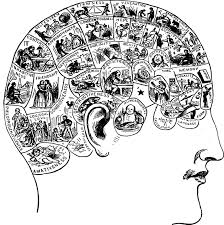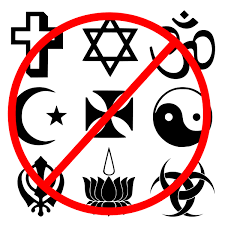Religion.
There are basically two different types, from which all sub-types stem: subject and object. Object religions are based on and require the worship of -go figure- objects, such as super-human entities, nature, or maybe even a penny some dude found on the side of the road while on a walk through the neighborhood (who knows WHAT objects are being/have been worshipped throughout the history of mankind!). Speaking of mankind, did you realize that religion and religious beliefs are only as old -or younger, depending on the religion- as human beings (on this planet, anyway)? I think it’s important to realize that NO OTHER ANIMAL on the planet seems to have a need for religious beliefs, even though humans tend to place extraordinary amounts of stock in their imagined necessity of religion. It seems odd that we’re the only ones… especially since we’re apparently the only ones that are aware of our own mortality.
Subject religions, on the other hand, do not require the belief in or worship of any deities or objects; or anything else, for that matter. I’m not going to be talking about subject religions in this blog, however, so let’s just forget they exist, except to establish a distinction between them and object religions.
Pseudoscience.
“WTF is that,” you ask?! Pseudoscience literally means “false” or “fake” science. Fake science is anything that claims to be scientific but does not follow the scientific method in order to ensure the accuracy of the “data” it produces. For those of you who are curious about what the scientific method is and why it’s so important when differentiating between actual science and pseudoscience, I’ve taken the time to provide you with some info about it, as published on Wikipedia (as of the date and time of this blog):
 “Scientific method is a body of techniques for investigating phenomena, acquiring new knowledge, or correcting and integrating previous knowledge. It is based on gathering observable, empirical and measurable evidence subject to specific principles of reasoning,[1] the collection of data through observation and experimentation, and the formulation and testing of hypotheses.[2]
“Scientific method is a body of techniques for investigating phenomena, acquiring new knowledge, or correcting and integrating previous knowledge. It is based on gathering observable, empirical and measurable evidence subject to specific principles of reasoning,[1] the collection of data through observation and experimentation, and the formulation and testing of hypotheses.[2]
Although procedures vary from one field of inquiry to another, identifiable features distinguish scientific inquiry from other methodologies of knowledge. Scientific researchers propose hypotheses as explanations of phenomena, and design experimental studies to test these hypotheses. These steps must be repeatable in order to predict dependably any future results. Theories that encompass wider domains of inquiry may bind many hypotheses together in a coherent structure. This, in turn, may help form new hypotheses or place groups of hypotheses into context.
Among other facets shared by the various fields of inquiry is the conviction that the process must be objective to reduce a biased interpretation of the results. Another basic expectation is to document, archive and share all data and methodology so it is available for careful scrutiny by other scientists, thereby allowing other researchers the opportunity to verify results by attempting to reproduce them. This practice, called full disclosure, also allows statistical measures of the reliability of these data to be established.”
Astrology is probably the most widespread pseudoscience in the “Western world.” In “The East,” a comparably widespread pseudoscience would be I Ching divination. Believers/followers of pseudosciences typically become amazingly defensive when confronted with actual scientific scrutiny of their beloved fake science. Real science has nothing to fear or hide, and most real scientists actually encourage careful scrutiny of their data.
You may be wondering what point I’m trying to make, so I’ll get right to it:
It is discouraging that so many human beings refuse to live in the realm of reality. Too many people blindly subscribe to object religions and pseudosciences without questioning the truth of the beliefs they are told to follow. It is stunning how willing so many people are to accept completely insane, ignorant, arbitrarily random beliefs, which are nauseatingly abundant in object religions and pseudosciences. Why?
Death.
Mortality is certainly a pain in the ass. Nobody likes the idea that someday they will cease to exist. Unless they’re suicidal, of course. But then, even suicidal people are scared of the unknown. Who knows, maybe they won’t cease to exist. What then? Are they going to be screwed in the afterlife because they decided to take a shortcut to infinity? Talk about adding insult to injury, eh?!
Death should remind you of the beauty of life, not inspire you to believe some fantastical story that some other person or group of people thought up to help him/her/themselves sleep better at night. How ridiculous is that?! It’s even weirder when people believe in some sort of afterlife and actually can’t wait for it to begin. Honestly, to hate your own life so much that you turn to a belief in an afterlife, which itself was created/imagined by people who didn’t want to believe that life really ended at some point in time, is completely insane (not to mention ironic). Or maybe you made up your own idea of an afterlife, which is even more insane, because how could you possibly believe that an idea that you came up with about something like an afterlife, which you have no knowledge of, and no way of gaining any knowledge of (while you’re alive, that is), is what really happens when you die?
Please, do yourself a favor, and stop believing anything that you can’t experience right now, in this moment. After all, right now is all you have. Yesterday doesn’t exist anymore. Neither does a second ago, for that matter. Tomorrow doesn’t exist, either. Not yet, anyway. And besides, can you be certain that it will? You might die within the next second. So cherish the moment you have right now. Don’t worry about the moments you either no longer have, or haven’t had yet. That’s like wishing you could breathe the same breath twice. Why does that seem any more foolish than wishing you could relive the same moment twice?
Death is nothing more than the cessation of your experience. There are plenty of experiences to have out there. Go out and experience as many as you can before they stop. Don’t worry about how many more you’ll have, or you won’t fully enjoy the ones you do have.






